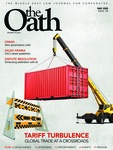Why mediate?

Hiam Al Muhtadi explores the benefits of amicable settlements of commercial disputes, the necessity of documenting settlements, and offers an overview of the UAE Mediation Law, Federal Decree Law No. 40 of 2023.
Mediation is a common forum of dispute resolution in the United Arab Emirates (“UAE”) and has proven to be the most cost-effective dispute resolution process which enables parties to thoroughly consider the commercial elements of their dispute, and preserves the commercial relationship of the disputing parties.
This article highlights the advantages of mediating disputes, the importance of documenting settlements to safeguard the legal and commercial interests of disputing entities, and provides a general overview of Federal Decree Law No. 40 of 2023 on Mediation and Conciliation of Civil and Commercial Disputes (“UAE Mediation Law”).
Litigation vs. Mediation
The process of litigating disputes before the UAE courts or through arbitration is time consuming with various procedural requirements and stages, costly with professional legal fees, court costs and other legal expenses, and could potentially impair the commercial relationship between companies in dispute, making it more difficult to maintain long-term business partnerships.
Mediation is generally less costly and time consuming and less procedurally intensive, compared to litigation and arbitration proceedings. To the contrary, disputes can be mediated in a short time frame and in some cases, in a matter of weeks compared to several months or years before the UAE courts.
Mediation sessions are also confidential and not open to the public, which makes it easier for parties in dispute to collaborate closely on reaching favorable and effective resolution of disputes.
Once the parties reach a settlement, the terms should be documented in writing through a settlement agreement and signed by both parties rendering it legally binding and enforceable. In practice, the UAE courts typically enforce settlement agreements which in essence have the effect of a court judgment.
The likelihood of success for the injured party in legal proceedings is not always promising given the UAE courts and arbitrators do not typically follow precedents consistently, which could potentially lead to unpredictable outcomes and varying judgments in different cases. In light of the expensive nature of litigation and arbitrations and the fact that the prospects of success for either of the disputing parties are unpredictable, it is prudent for the parties to carefully conduct a cost-benefit analysis before instigating legal action and consider the viability of an out-of-court settlement.
Mediation Centre Guidelines: Scope, Authority, Fees and Impact
The UAE Mediation Law which came into force on December 29, 2023, established the formation of Mediation and Conciliation Centres (“Mediation Centre”) consisting of mediators and conciliators who are tasked with reviewing civil and commercial disputes with values not exceeding five million dirhams, excluding interim or summary orders, rent, labor and personal status cases, cases involving government entities, and other cases that fall within the jurisdiction of other centres and committees.
Parties involved in civil or commercial disputes exceeding five million dirhams also have the right to resort to the Mediation Centre either during or prior to the case being heard by the UAE courts.
Sessions before the Mediation Centre may also be conducted remotely or through electronic means, subject to the approval of the Council or the president of the local judicial authority.
The mediation process before the Mediation Centre including all information and documentation presented by the parties are confidential and may not be used or disclosed before courts or any authority or entity. Parties involved in the mediation process including the mediator or conciliator may not disclose any information related to the mediation without the consent of all involved parties, save for crimes which require reporting, settlement terms between the parties and all documentation relevant to the enforcement thereof.
No fees are payable by the parties for filing applications before the Mediation Centre, however, the parties in dispute are required to pay mediation costs in full before the commencement of the mediation process. In the event the parties successfully settle the dispute, the Mediation Centre may refund legal expenses paid by the parties.
Mediators and conciliators are not permitted to act as arbitrators or experts in mediation sessions, or represent either of the disputing parties in litigation proceedings or provide depositions or testimonies against either of the parties (provided the testimony is not related to a crime), notwithstanding the closure of the mediation process, unless the parties agree otherwise.
If the parties fail to resolve the dispute, the Mediation Centre shall refer the dispute to the competent court. If on the contrary, the parties have come to a resolution of the dispute, either in whole or in part, the terms of the settlement shall be recorded and signed by the parties and the mediator reviewing the dispute. The minutes documenting the settlement must also be approved by the judge supervising the dispute and shall have the legal force of a writ of execution which has the legal standing similar to a court judgment, and can accordingly be enforced in accordance with the Federal Civil Procedures Law. In addition, the minutes cannot be challenged through any means or avenue of contest.
Conclusion
Mediation of disputes whether at a commercial level between representatives of the parties without engaging a formal mediation committee or mediator, or through the Mediation Centre or other reconciliation committees, better serves the commercial interests of parties in dispute, offers flexible solutions specifically designed for the disputing entities, and avoids lengthy and costly court proceedings which may potentially not lead to desired outcomes.
The establishment of the Mediation Centre is anticipated to have promising impacts on the resolution of disputes between commercial entities and is a testament to the UAE’s dedication to implement legislation and initiatives that are tailored to facilitate amicable settlement of disputes with the aim of preserving and fostering enduring business partnerships.
Text by:

Hiam Al Muhtadi, legal director in the telecommunications sector, Dubai

























































































































